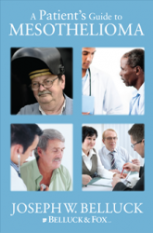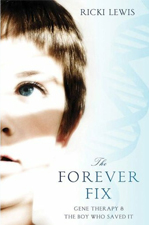The Role of Genetics in Understanding Mesothelioma
 Author Ricki Lewis Discusses Role of Genetics in Understanding Mesothelioma
Author Ricki Lewis Discusses Role of Genetics in Understanding Mesothelioma
Ricki Lewis, a New York-based geneticist and author, has written a fascinating book entitled The Forever Fix about the use of gene therapy to restore the vision of young Corey Haas, who was nearly blind from a hereditary disorder. Doctors replaced the defective gene in the New York boy’s eyes, allowing him to see.
Gene therapy is a new frontier in medical treatment and is still experimental. It has been in clinical trials since 1990. But gene therapy holds enormous potential, as the restoration of young Corey’s vision demonstrates. Scientists are exploring the applications of genetic research and gene therapy to a broad range of conditions and diseases, including cancers such as mesothelioma, an aggressive cancer caused by exposure to asbestos. Genes may influence susceptibility to this cancer.
Lewis, who has a Ph.D. in genetics and has also written a college textbook on human genetics, predicted that gene therapy would be used initially to treat rare diseases caused by a defect in a single gene. Young Corey Haas’s condition fits that category and could eventually become the first approved use of gene therapy. His disorder was caused by an abnormality in a single gene that prevented his eyes from using vitamin A to send visual signals to his brain. Doctors identified the defective gene and replaced it with a healthy gene, just as computer programmers might rewrite defective code in computer software.
“He found out it worked four days after the gene therapy at the Philadelphia Zoo,” said Lewis who is adept at making complex medical research understandable. “He screamed because he looked up and it was the first time he saw the sun. It’s pretty amazing.”
Lewis, who lives near Schenectady, New York, said gene therapy when approved by the Food and Drug Administration will help some of the 30 million people with rare diseases that have been ignored because they are so rare.
“The goal of gene therapy is to replace faulty instructions,” Lewis said. “It’s not right for every disease. But it is an approach that can be considered some day along with drugs, surgery and everything else.”
Most rare diseases are caused by a single gene defect, making them better candidates for gene therapy, Lewis said. Meanwhile, most common diseases (including cancers) are caused by combinations of genes and environmental influences.
“With the little boy in my book, it’s one gene that messes up his eye so it was fairly easy to replace,” Lewis said. “With cancer, it’s harder because of the environmental component. It’s harder because cancer cells mutate as the disease progresses.”
As a geneticist, Lewis said she is curious why some people develop mesothelioma from inhaling microscopic asbestos fibers and others do not. “There has to be a reason,” she said.
Lewis pointed to a current genetics study led by Jill Ohar, a medical researcher at Wake Forest University, who is investigating whether a person’s genes increase the risk of developing mesothelioma. Researchers are seeking to analyze the DNA of 2,000 people chronically exposed to asbestos, including 1,000 people who have developed mesothelioma and 1,000 people who have not developed the disease, despite asbestos exposure.
“She is doing exactly what I think should be done,” Lewis said. “She is asking what protected the 1,000, who didn’t develop mesothelioma. That way, researchers can identify the genes that protect people. Once we know the genes that protect people and we know how they work, then drug developers can develop drugs. “
”Getting at the basis of why one person develops mesothelioma and another person doesn’t, that is going to hold a clue to really fighting it,” Lewis said. “Then we will know what to do the gene therapy on.”
The Wake Forest University-sponsored clinical trial is currently recruiting patients. Collaborators in the study include the University of Pennsylvania, Mayo Clinic, New York University School of Medicine, Johns Hopkins, Mount Sinai School of Medicine and Memorial Sloan-Kettering Cancer Center.
The attorneys of Belluck & Fox want people dealing with mesothelioma and their families to have good general information about emerging medical treatments and relevant clinical trials. It’s also important for mesothelioma patients to understand their legal options to seek compensation after a diagnosis of mesothelioma.
Contact New York Mesothelioma Lawyer
Belluck & Fox, a New York law firm, is an advocate for mesothelioma victims and their families. The firm provides professional and personalized legal representation A lawyer at Belluck & Fox can evaluate your case and discuss your options at no charge. Call (877) 637-6843 or fill out our online contact form.


